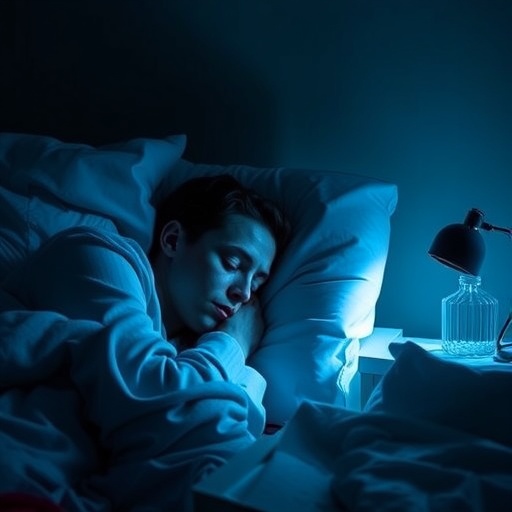A recent study published in BMC Psychiatry presents groundbreaking insights into the complex interplay between insomnia, anxiety, depression, and suicidal ideation among individuals subjected to enforced isolation during the Shanghai lockdown. This research highlights the psychological consequences of isolation in Fangcang shelter hospitals, revealing critical pathways through which mental health deteriorates, potentially escalating to suicidal thoughts.
The study zeroes in on the mediating roles anxiety and depression play in the nexus between insomnia and suicidal ideation, unearthing that these emotional disorders act as pivotal conduits escalating the severity of distress experienced by isolated individuals. Isolation’s psychological burden, often underestimated, is catalyzed by sleep disturbances, fostering a cascade of mental health challenges.
Utilizing a cross-sectional design and convenience sampling, researchers gathered data from 461 isolated individuals, meticulously assessing their demographic backgrounds alongside measures of insomnia severity, anxiety symptoms, depressive states, and suicidal ideation intensity. This robust dataset enabled the examination of interrelationships among these variables, offering a nuanced understanding of their interconnectedness.
Statistical analyses revealed that insomnia, anxiety, depression, and suicidal ideation are not merely co-occurring phenomena but are tightly interlinked with significant positive correlations. More strikingly, anxiety and depression did not merely coexist with insomnia and suicidal ideation—they fully mediated the relationship between sleep disturbances and suicidal thoughts. This full mediation indicates that insomnia leads to suicidal ideation primarily through its influence on anxiety and depression symptoms, rather than through a direct pathway.
Specifically, anxiety accounted for approximately 62.65% of the mediating effect linking insomnia to suicidal ideation, while depression contributed an even more substantial 77.11%. These figures underscore the profound impact of emotional disorders as intermediaries transforming sleep disruption into existential crises among vulnerable individuals.
The study suggests that insomnia’s detrimental effects on mental health are transduced via heightened anxiety and depressive symptomatology, which in isolation may significantly compromise psychological resilience. As a result, individuals isolated under stressful circumstances are caught in a vicious cycle where poor sleep quality exacerbates negative mood states, which intensify suicidal ideation.
This research carries significant implications for mental health interventions targeted at isolated populations. Addressing insomnia alone may be insufficient to disrupt the path to suicidal ideation unless concurrent anxiety and depression symptoms are also effectively managed. Holistic treatment approaches integrating cognitive-behavioral therapy for insomnia, alongside pharmacological or psychotherapeutic interventions for anxiety and depression, may thus prove vital.
Moreover, the findings emphasize the need for proactive screening and early detection of sleep disorders and emotional disturbances in isolated and quarantined individuals to prevent escalation to suicidal ideation. Mental health services operating within shelter hospitals or similar settings must prioritize comprehensive assessments and tailored care plans addressing the multifaceted dimensions of psychological distress.
The context of the Shanghai lockdown and Fangcang shelter hospitals underscores how public health emergencies compound mental health vulnerabilities. Isolation under such extraordinary circumstances introduces environmental stressors that precipitate or worsen preexisting psychological conditions, rendering sleep and mood disorders particularly salient.
This study is among the first to quantify the mediation effects of anxiety and depression in sleep-related suicidal ideation within a context marked by stringent quarantine measures. Its methodological rigor and sizable sample lend credibility to its conclusions, which are poised to inform future research and public health policies worldwide.
Ultimately, the research calls for integrated mental health frameworks that acknowledge the critical intersections between sleep disturbances, emotional dysregulation, and suicidality amid isolation. Deploying targeted interventions to mitigate insomnia, alleviate anxiety, and treat depression could substantially reduce suicidal ideation risks among secluded populations, fostering improved psychological resilience.
The insights garnered from this investigation extend beyond the immediate pandemic context, resonating with broader understandings of how compounded stressors and sleep disruptions synergize to shape mental health trajectories. As societies grapple with ongoing and future challenges that may necessitate isolation, prioritizing mental health through comprehensive, symptom-spanning approaches will be crucial.
In conclusion, this study elucidates the central role played by anxiety and depression as mediators in the relationship between insomnia and suicidal ideation among isolated individuals. It advocates for multidimensional intervention strategies addressing these intertwined mental health factors to prevent suicidal thinking and promote overall psychological well-being in times of enforced isolation.
Subject of Research: The mediating effects of anxiety and depression on the relationship between insomnia and suicidal ideation in isolated individuals during the Shanghai lockdown.
Article Title: Anxiety and depression as mediators in insomnia-suicidal ideation link among isolated individuals
Article References:
Mao, X., Zhang, F., Ni, C. et al. Anxiety and depression as mediators in insomnia-suicidal ideation link among isolated individuals. BMC Psychiatry 25, 984 (2025). https://doi.org/10.1186/s12888-025-07454-3
Image Credits: AI Generated




